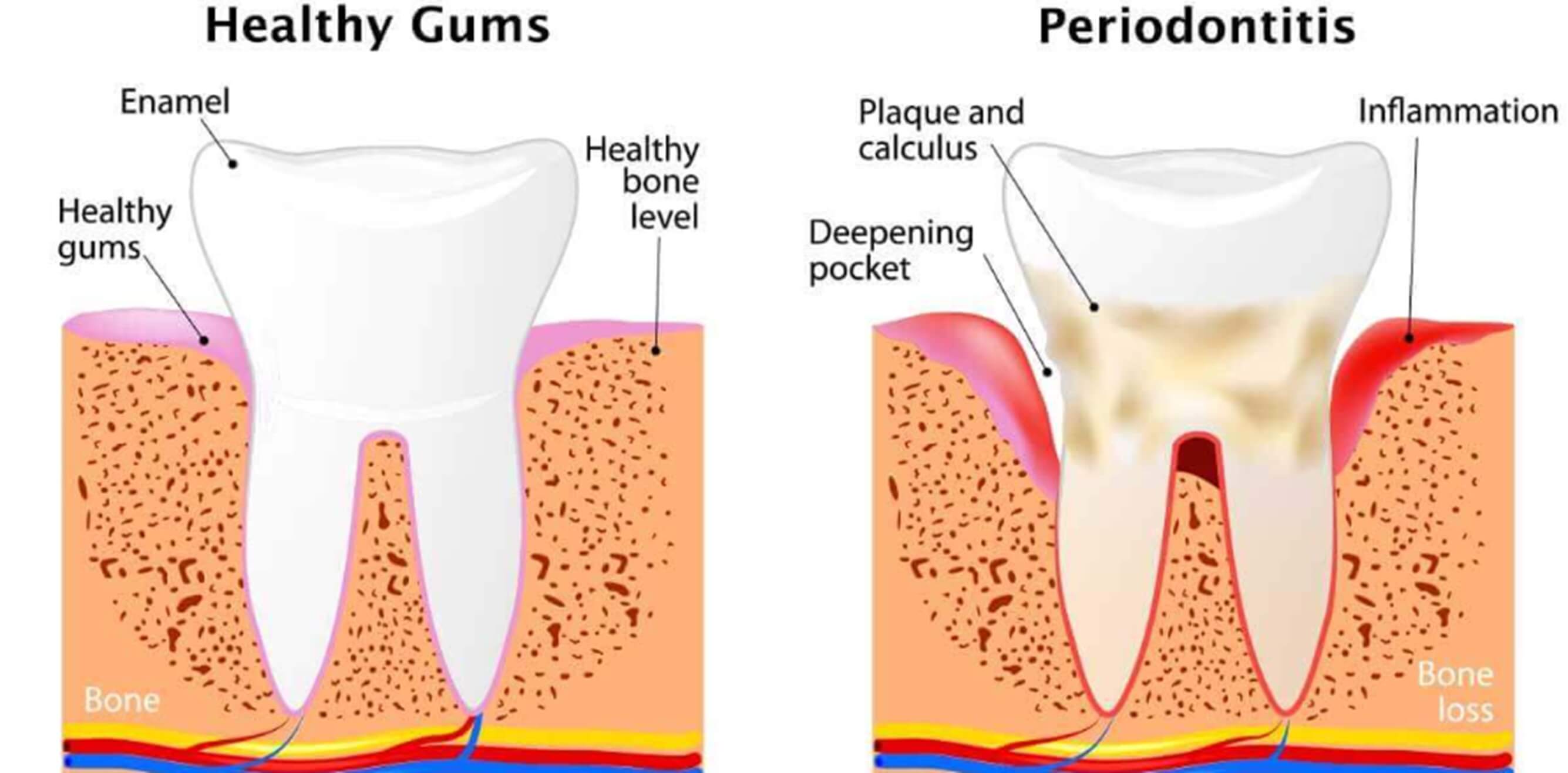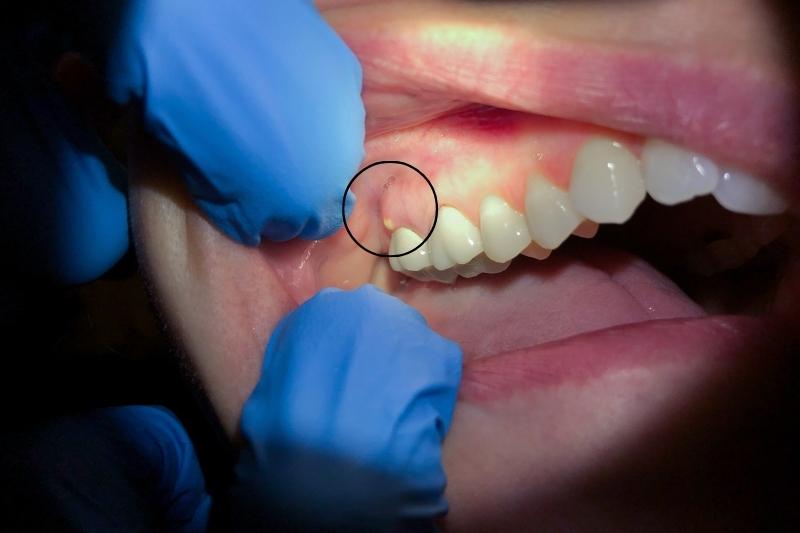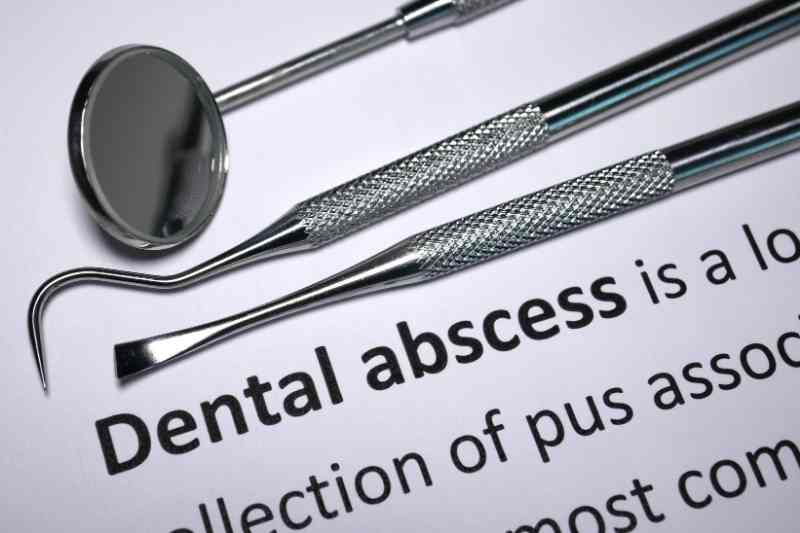
Abscesses are swellings formed by dead and damaged red blood cells in a specific area that cannot exit the body. If this swelling occurs in the gum or tooth root, it is called a tooth abscess.
A tooth abscess is a medical condition that appears as a toothache, swelling, or redness on the gums, as part of the body's reaction to bacteria. Let's take a deeper look at tooth abscesses and how they can manifest themselves.
What is a Tooth Abscess?

A tooth abscess is an advanced infection that forms at the junction of the gums and the ends of the tooth roots. There are mainly two distinct kinds of oral abscesses. Periodontal abscesses develop in the gums, while periapical abscesses develop around the tooth roots. In most cases, periapical abscesses form due to dental decay, cavities, or previous mistreatments, while periodontal abscesses form when food becomes lodged between teeth and germs start growing.
Dental abscesses are bacterial infections. If left untreated, dental caries can spread through dental pulp or fractures and cracks on teeth. In addition, they may provoke swelling on the skin and gums if they reach the root of the tooth.
Gingival abscesses generally develop over time, so their symptoms are not recognized easily. On the other hand, abscesses that affect the pulp chamber, that is, the nerves, can cause severe pain.
What Causes a Tooth Abscess?
Abscesses can be classified into two types. They may form between the teeth and at the roots of the teeth. The formation of abscesses also varies based on the location of the infection. In a periapical abscess, bacteria reach the teeth through tiny holes in the cavities.
These are the main reasons that trigger abscess formation;
- Frequent consumption of sugary foods and beverages,
- Excessive consumption of carbohydrates,
- Neglecting oral care,
- Drinking insufficient water,
- Tooth decay,
- Damaged tooth enamel,
- Using the same toothbrush for a long time.
How Long Until a Tooth Infection Kills You?
Untreated tooth abscesses are often perceived as a minor inconvenience. However, the veins traversing the abscess region pose a risk of disseminating the infection throughout the body. Occasionally, the infection can propagate to various bodily regions within weeks or months due to a dental infection. Therefore, prompt intervention for dental infections is crucial. In certain instances, the abscess may manifest externally through the skin. While this visibility may alarm patients, it is preferable to the infection remaining concealed beneath the skin.
Can a Tooth Abscess Kill You?
A tooth abscess infection arises when pus accumulates in the soft tissues of the palate and exacerbates if untreated. The dissemination of the infection to other bodily regions compromises the immune system.
The propagation of an abscess throughout the body can lead to various complications in different areas. For instance, an abscess that extends to the brain may result in meningitis or a life-threatening tumor known as a brain abscess. Similarly, bacteria that enter the bloodstream and reach the heart can accumulate on the heart valves, forming abscesses termed infective endocarditis, which are notoriously challenging to manage.
Another site for abscess accumulation during systemic spread is the joints, such as the patella. Abscesses in these locations lead to localized issues and are exceedingly difficult to treat.
When Does a Tooth Infection Become Life-Threatening?
Untreated dental infections gradually show some symptoms in the body. Each stage of infection needs a different treatment requirement. For this reason, it is very important to intervene without delay.
1. Sepsis (Blood Poisoning)
Sepsis is defined as an extreme and life-threatening reaction of the body to an infection. Bacteria from a dental abscess can enter the bloodstream and cause sepsis. Symptoms of sepsis include severe high fever, persistent dizziness, sudden shortness of breath, rapid heartbeat and digestive problems. Sepsis can lead to organ failure and can be fatal if left untreated. Therefore, it is vital that you seek medical attention immediately when you notice signs of a tooth abscess.
2. Necrotising Fasciitis (Dead Tissue Infection)
Necrotising fasciitis is a severe infection in which bacteria spread rapidly to soft tissues, causing them to die. This condition requires urgent intervention because the infection spreads rapidly and can damage vital organs of the body. Failure to control a dental abscess can lead to this type of infection, which can be life-threatening. Symptoms include severe pain, swelling, redness and bruising of the skin. If not treated quickly, necrotising fasciitis can be fatal.
3. Ludwig's Angina
Ludwig's angina is a serious condition in which a bacterial infection affects the floor of the mouth, under the tongue and the side tissues. This infection can block the airways, causing breathing difficulties and even respiratory arrest. Symptoms include swelling of the floor of the mouth, pain, difficulty swallowing and fever. Early diagnosis and treatment is vital as Ludwig's angina can spread rapidly. This condition requires urgent medical attention and can be life-threatening.
4. Blood Clots
Dental infections can lead to the development of blood clots (thrombi), especially in the sinuses. When these clots form near the brain, they can lead to stroke or other serious neurological complications. Blood clots can block blood flow, causing brain tissue to lack oxygen and nutrients. Symptoms include sudden headaches, visual disturbances, difficulty speaking and weakness. When the dental abscess is not treated, it increases the risk of such blood clots.
5. Mediastinitis
Mediastinitis is an inflammation of the mediastinum in the central part of the chest cavity. Bacteria from a dental abscess can spread to the chest area by swallowing and cause this serious condition. Symptoms of mediastinitis include severe chest pain, fever, chills, shortness of breath and difficulty swallowing. This condition can progress rapidly and can be fatal if left untreated. It requires early diagnosis and aggressive antibiotic treatment.
6. Osteomyelitis (Bone Infection)
Osteomyelitis is an infection of the bones and can spread to the jaw or facial bones if the tooth abscess is not controlled. This infection can lead to inflammation of bone tissue and death. Symptoms include bone pain, swelling, redness and fever. Osteomyelitis can disrupt the structure of bones, causing permanent damage and serious health problems. Inaddition, endocarditis, cavernous sinus thrombosis and brain abscess are other complications that are serious if an infection spreads and requires immediate professional help.
Untreated dental infections gradually show some symptoms in the body. Each stage of infection needs a different treatment requirement. For this reason, it is very important to intervene without delay.

What are the Symptoms of Tooth Abscess?
A tooth abscess will often cause excruciating pain, but an abscess that forms at a site where nerves have been removed will not. Signs of a tooth abscess include severe pain, either stabbing or dulling and worsening discomfort in response to heat and pressure.
Dental abscesses may spread to other areas of the body if they are not addressed. If your abscess is feverish and begins to obstruct your airway or swallow, you must seek medical attention immediately because this could have serious consequences. A cyst may form when an abscess comes into contact with certain tissues in the body.
Tooth abscess symptoms are quite obvious and similar for most patients. Occasionally, abscesses do not cause pain but may cause swelling in the cheeks and gums. In the case of a root canal tooth, the abscess might not cause any pain since the nerve is dead.
Recognizing the Signs: Symptoms and Pain Associated with Tooth Abscesses
The followings are common symptoms of dental abscesses:
- An extreme, sharp, or throbbing pain,
- Applying heat or pressure to the affected area worsens the pain,
- Swelling of the face in extreme cases,
- Bad breath,
- Fire,
- Trismus (inability to open the mouth),
- Insomnia,
- General discomfort and distress.
Four Risks Regarding Dental Abscesses
Dental infections do not manifest uniformly among individuals. Certain individuals are more susceptible to consequences from these illnesses due to specific health conditions or lifestyle variables. We outline four significant characteristics that elevate the danger of the dissemination of dental infections:
1. Advanced Age: Reasons for Increased Risk
Diminished Immune Function: As we age, the immune system deteriorates, diminishing the body's ability to combat illnesses. In older adults, immune defenses diminish and susceptibility to infections increases.
The prevalence of chronic diseases, including diabetes, cardiovascular diseases, and hypertension, is higher in the aged population. These conditions elevate the likelihood of consequences from oral infections and promote the dissemination of infection throughout the body.
Oral health issues, including periodontal disorders, edentulism, and the utilization of dentures, are more prevalent in the senior population. These diseases elevate the risk of infections, including oral abscesses, and complicate the treatment of pre-existing infections.
2. Immunological Deficiency What Accounts for Increased Vulnerability?
The administration of immunosuppressive medicines, including those utilized in cancer therapy and post-organ transplantation, diminishes immune system function and markedly impairs the body's capacity to combat infections.
HIV/AIDS and Other Immunodeficiency Disorders: Conditions like HIV/AIDS significantly impair the immune system, resulting in the rapid proliferation of tooth infections and subsequent consequences.
The influence of age and chronic illnesses: Advanced age and chronic diseases lead to the inherent deterioration of the immune system. This condition facilitates the proliferation of microorganisms within the body and the dissemination of diseases.
3. Diabetes What Contributes to Increased Risk?
Elevated Blood Glucose Levels: Diabetes diminishes the body's immunity to infections and impedes the healing process. Elevated glucose levels promote bacterial proliferation and accelerate the dissemination of illnesses.
Diabetes-induced peripheral neuropathy and circulatory issues impede the healing of mouth sores and infections. This hinders the management of the tooth abscess and elevates the danger of infection dissemination.
Heightened Risk of Infection: Individuals with diabetes exhibit a greater susceptibility to periodontal disease and tooth abscesses. Inadequate blood sugar regulation adversely impacts dental health, heightening the susceptibility to infection.
4. Insufficient Nutrition Reasons for Increased Risk?
Immunological Deterioration: Malnutrition adversely impacts the immune system, diminishing resistance to infections. Deficiencies in protein, vitamins, and minerals significantly hinder the functioning of immune cells.
Deficiencies in Vitamins and Minerals: Deficiencies in vitamins A, C, and D, as well as zinc, adversely impact oral health and diminish resistance to tooth infections. These deficits promote the development of gingivitis and abscesses.
Decline in Overall Health Condition: Chronic malnutrition diminishes general health and increases susceptibility to illnesses. This accelerates the proliferation of the dental abscess and results in severe problems.
Navigating Treatment Risks: The Importance of Early Antibiotic Therapy
Because there are hazards associated with anaesthetizing the region where the abscess is situated, it is crucial to begin antibiotic therapy as soon as possible. The first danger is that the pH level in the abscess region may drop too low for the anaesthesia to be effective, creating an acidic environment. There is also a possibility that the anesthesia will spread harmful toxins from the area where the cyst is to healthy tissues nearby. Therefore, abscess therapies should aim to numb the nerve roots rather than the abscess itself.
Home Remedies and Temporary Relief
Tooth abscesses can be treated immediately at home with cold compresses, clove oil and other methods, which provide temporary pain relief. However, a comprehensive treatment is essential to eliminate the conditions that created the abscess. Therefore, a dentist needs to check and provide treatment.
Poor oral hygiene, especially after consuming sugary food and carbohydrates, contributes to the formation of abscesses. When dental caries are not treated, they come out of the teeth through cracks or fractures. Even though an abscess cannot be completely removed by tooth abscess home remedy, there are some practical methods to get rid of its pain and discomfort.
1- Cold Compress

The cold compress relieves pain in the abscess area by reducing blood pressure. Additionally, a cold compress can prevent swelling from growing.
2- Aloe Vera Gel
Aloe vera gel has antibacterial properties and provides immediate relief from toothache and infection caused by tooth abscesses.
3- Sumac Water
Sumac is an antioxidant-rich spice. Besides treating diseases such as fever and flu, sumac can also be gargled to treat abscessed teeth. You can reduce tooth abscess effects by gargling with 1 tablespoon of sumac in water.
4- Baking Soda
The baking soda works great for reducing pain caused by abscesses. It can be easily prepared by adding one teaspoon of baking soda to warm water.
5- Garlic
Known as a natural antibiotic, garlic is also very effective in tooth abscesses. You can put the garlic on the abscessed area, wait for a while and then throw it away. If you wish, you can also consume garlic against abscesses.
6- Clove Oil
Clove oil is very effective against oral infections and dental abscesses. However, excessive use can damage the gums. So, you can pour 1 gr. of clove oil on clean cotton and apply it to the abscessed area.
7- Salt Water
You can apply salt water to temporarily relieve abscess pain. In addition, saltwater promotes gum health and aids in healing. Add 1 teaspoon of salt to a glass of water and gargle for two minutes.
8- Mint Tea
Peppermint tea is another effective way to reduce the pain caused by tooth abscesses. You can cool a bag of mint tea and apply it to the aching area if you wish. The refreshing effect of mint helps to feel less pain.
9- Apple Juice
Apple juice is one of the effective methods in the solution of tooth abscesses with its high antioxidant value. It is also possible to contribute to oral health by consuming apples.
Hydrogen peroxide is often recommended to treat abscesses. However, it is not recommended to use this method since hydrogen peroxide irritates soft tissues which can lead to permanent damage to the gums.

How do Dentists Treat an Abscess?
The completion of the acute stage is crucial for the effective treatment of dental abscesses. If it's in its early stages, the therapy involves reestablishing the bone structure by injecting the root canal with agents that speed up the process of bone growth. It may be necessary to extract the tooth if the root canal procedure fails to alleviate the abscess.
Unfortunately, bacterial sepsis may develop if an abscessed tooth is extracted because the abscess can seep into the bloodstream via the extraction hole. As a result, during the acute phase, antibiotic therapy takes precedence, and then, after the antibiotic dosage is reached, the abscessed tooth is pulled. After the extraction, the affected region has to be cleansed using the right instruments, and then the tissue needs to regenerate.
In the past, the only treatment for an abscessed tooth was extraction However, dentists today can often heal abscessed teeth.
Tooth Abscess Treatment
Initially, your dentist will administer tooth abscess antibiotics to alleviate the infection. This will also prevent the infection from spreading to other parts of your body.
Your dentist will then numb the area and drill a hole in the tooth socket. This will reduce the pressure caused by the abscess. The tooth socket is cleaned, disinfected, and refilled in the last stage.
Several months later, the dentist checks the area to see if healthy tissue has grown. In the event that the infection persists, additional surgical procedures are required for the treatment for tooth abscess.
How to Prevent Tooth Abscess?
It is due to poor oral hygiene that abscesses form. The following points are important to remember in order to prevent abscesses:
- Drink water containing fluoride.
- Make sure the toothpaste contains fluoride.
- Change your toothbrush every three months.
- Use dental floss.
- Use mouthwashes containing antibacterial and fluoride ingredients to remove food residues.
- Avoid excessive consumption of sugary and carbohydrate foods.
- Get regular dental care.
Tooth Abscess FAQ
How Would I Know if I had an Abscess in My Tooth?
Hot foods or drinks trigger hypersensitivity in the early stages of an abscess. This is followed by swelling of the gums and pain when chewing and biting. Face swelling, fever, and throbbing pain appear as the disease advances.
Will a Tooth Abscess Go Away with Antibiotics?
Antibiotics can usually stop abscesses from spreading, but they cannot cure them completely. To completely clean abscesses, surgery is required.
Can I Squeeze a Tooth Abscess?
A tooth abscess can grow larger if squeezed. It is necessary to apply to the dentist as soon as possible. You can use home remedies to heal pain and slow down infection spread.
Can I Pop an Abscess with a Needle?
Blasting the abscess with a needle causes more harm than good. This procedure should only be performed by a maxillofacial surgeon in a hospital environment and can't be performed at home.
Can a Tooth Abscess Heal on Its Own
A tooth abscess is a symptom caused by the body's response to an infection. Before the inflammation is cleared and the disease is completely eradicated, they do not disappear on their own.
Ignoring tooth abscesses can have serious consequences. It may spread to the surrounding tissues and jawbone, causing severe pain and difficulty swallowing. It can then spread throughout the body and weaken your immune system. Do not be late for your dental appointment if you have a tooth abscess.
Your Path to Wellness: Don't overlook the indications of a tooth abscess; take proactive actions toward a healthy smile now. Antlara Dental Clinic is a reliable ally in the fight against tooth abscesses, providing skilled attention and thorough treatments. Our proficient staff comprehends the need to promptly manage dental infections, offering appropriate therapies to reduce discomfort and avert further difficulties.
